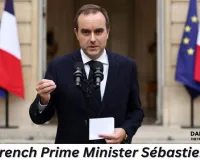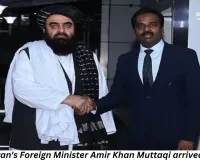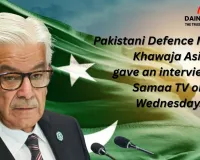India Rejects Trump’s Claim on Russian Oil Ban: MEA Says ‘No Phone Call Between PM Modi and Trump’
Digital Desk

India’s Ministry of External Affairs (MEA) has denied U.S. President Donald Trump’s claim that Prime Minister Narendra Modi assured him India would halt energy trade with Russia.
At the ministry’s weekly briefing, MEA spokesperson Randhir Jaiswal clarified:
“I have no information regarding any telephonic conversation between Prime Minister Modi and former U.S. President Donald Trump on the subject of India’s oil imports from Russia.”
Trump, while addressing a press conference at the White House on Thursday, claimed that Modi had personally assured him India would stop buying Russian crude.
“Prime Minister Modi is my friend. We have a great relationship. I wasn’t happy with India purchasing oil from Russia, but today he assured me they will no longer do so. That’s a big step. Now we have to get China to do the same,” Trump said.
U.S. Tariffs and India’s Energy Position
In August 2025, the United States imposed an additional 25% tariff on Indian imports for continuing to purchase Russian oil, raising the total duty burden to 50% when combined with existing reciprocal tariffs.
India has consistently defended its stance, stating that its energy policy is guided by national interest and consumer affordability, not external pressure.
Russia Reaffirms Strong Energy Ties with India
A day after Trump’s statement, Russia’s Deputy Prime Minister Alexander Novak said Moscow’s energy cooperation with India remains unchanged.
Speaking to Interfax, Novak stated:
“We continue to cooperate with our friendly partners. Our energy resources are in demand, and this partnership is both economically viable and mutually beneficial.”
Opposition Criticism: Congress and Rahul Gandhi Target PM Modi
Following Trump’s claim, Congress leader Rahul Gandhi and the Congress party criticized Prime Minister Modi, accusing him of compromising India’s diplomatic autonomy.
In a post on X (formerly Twitter), Rahul Gandhi wrote:
“PM Modi is scared. He lets Trump announce that India won’t buy Russian oil. Even after being ignored repeatedly, he continues to send congratulatory messages to Trump.”
He also listed several alleged failures of the government, including the cancellation of Finance Minister Nirmala Sitharaman’s U.S. visit and India’s absence from the Sharm el-Sheikh summit.
The Congress party issued a statement calling Modi a “weak Prime Minister,” saying:
“Once again, Narendra Modi has compromised the nation’s dignity. According to Trump, he bowed to pressure and agreed to stop buying Russian oil. Such actions have weakened India’s foreign policy.”
Trump’s Clarification: ‘Modi Loves Me, But Don’t Misinterpret It’
Responding to reporters, Trump also mentioned that Sergio Gor, who is expected to be appointed as the next U.S. Ambassador to India, recently met Prime Minister Modi.
“After their meeting, Sergio told me that Modi loves Trump. But I’d like to clarify — the word ‘love’ shouldn’t be misinterpreted. I don’t want to ruin anyone’s political career,” Trump said jokingly.
Praising Modi’s leadership, he added:
“I’ve watched India for years — governments used to change frequently. My friend Modi has brought stability. He assured me that India will gradually end oil imports from Russia through a phased process.”
How India Became a Major Buyer of Russian Oil
India’s dependence on Russian crude soared after the Russia–Ukraine war began in February 2022. As Europe cut Russian imports, Moscow redirected supplies toward Asia.
- In 2021, India imported only 0.2% of its oil from Russia.
- By 2025, Russia had become India’s largest oil supplier, providing 1.67 million barrels per day, or 37% of total demand.
Why India Continued Buying Russian Oil
Despite Western pressure, India maintained Russian oil imports for several reasons:
- Discounted Prices: Russia offered rates up to $30 per barrel cheaper than global benchmarks (now narrowed to $3–6).
- Long-Term Contracts: Indian firms, including Reliance, signed multi-year deals — notably a 10-year contract in December 2024 for 500,000 barrels per day.
- Global Price Stability: Analysts say India’s continued purchases helped stabilize global oil prices, preventing spikes like the $137 per barrel surge seen in March 2022.
Alternative Oil Sources for India
If India gradually phases out Russian crude, it may rely more on:
- Iraq: Supplies about 21% of India’s oil imports.
- Saudi Arabia: Provides roughly 15% (around 700,000 barrels daily).
- United States: Exports to India have doubled in 2025, reaching 271,000 barrels per day, or 7% of total imports.
- African Nations: Nigeria and other producers are becoming significant partners.
- Other Sources: India is exploring options in Abu Dhabi (Murban crude), Guyana, Brazil, and Latin America, though these come at higher costs.
Official Position
As of now, the Indian government has not issued an official statement in response to Trump’s remarks. Officials have, however, reiterated that India’s energy strategy prioritizes affordability, stability, and national interest over geopolitical considerations.










.jpg)
